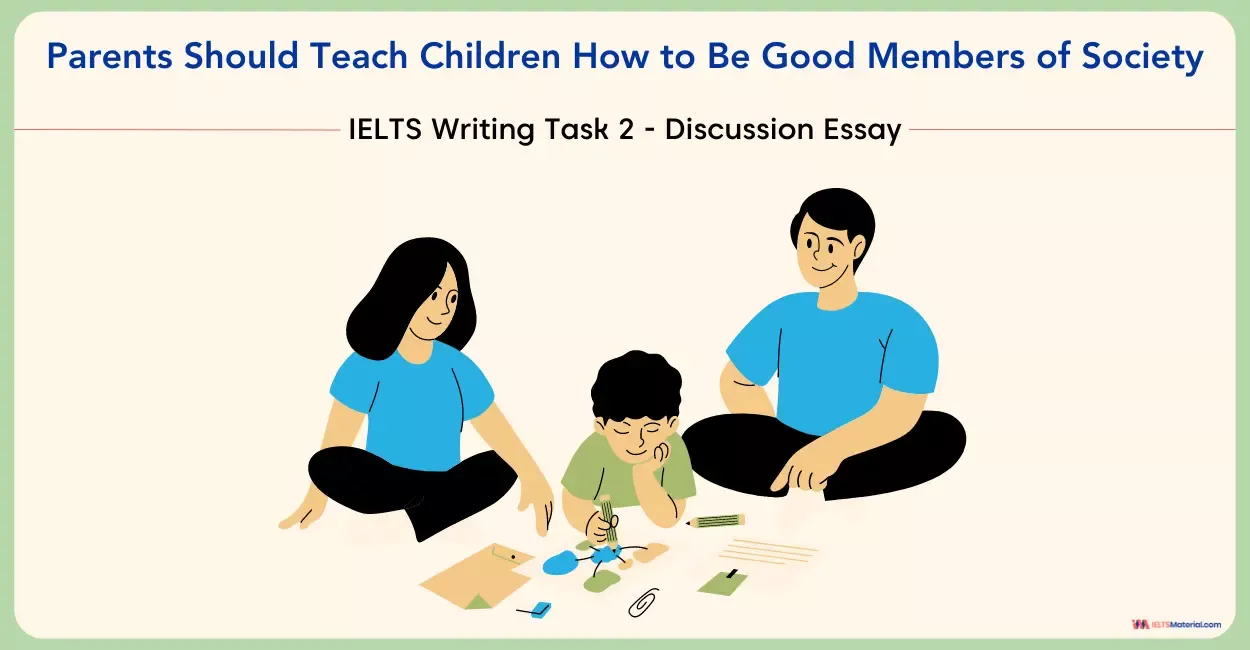How to Write an IELTS Discussion Essay?
9 min read
Updated On
-
Copy link
The article guides on writing a Band 8+ IELTS Discussion Essay, emphasizing clear structure, balanced arguments, and evidence support. It outlines planning, writing, common mistakes, and provides sample questions with answers.
Table of Contents
- How to Plan an IELTS Discussion Essay?
- Structure of an IELTS Writing Task 2 Discuss Both Views and Give Your Opinion Essay
- 3 Common Mistakes in IELTS Discuss Both Views and Give Your Opinion Essays
- Tips to Write an IELTS Discussion Essay
- IELTS Discussion Essay Sample Questions with Sample Answers
- Excel at IELTS Writing with IELTSMaterial.com
- Also Check:
Limited-Time Offer : Access a FREE 10-Day IELTS Study Plan!
Just as the names suggest, discuss both views or discussion essays in IELTS Writing Task 2 expects you to discuss both sides of an argument, and then to give your own opinion on the matter.
You get 40 minutes to complete this discussion essay IELTS Writing task and you have to write at least 250 words on the topic given. So gear up, let us learn how to write a perfect band 8+ task 2, discuss both views and essays in no time in this blog!
How to Plan an IELTS Discussion Essay?
There are a few key things to keep in mind when writing a discussion essay:
- Identify the two opposing views.
First, read the statement carefully and find the two opposing views. Then, think about how to support each one.
- Gather evidence to support both sides.
Once you know what the two opposing views are, you need to gather evidence to support each one.
This evidence can come from your own knowledge, experience, or research.
- Write a clear and organized essay.
Your essay should have a clear introduction, body paragraphs, and conclusion.
- Start with an Introduction
Begin your essay with a clear introduction that tells the reader what the topic is and what your main points will be. Keep it simple and to the point. You might find some tips to write an effective introduction for IELTS Writing Task 2 below.
- Use Paragraphs
Break your essay into two paragraphs, with each one focusing on a different point. Start each paragraph with a topic sentence that tells the reader what the paragraph is about.
- Give Examples
Use examples to support your points. This could be something you’ve read about, something you’ve seen, or something from your own experience.
Get your hands on 2024’s latest IELTS Writing Task 2 test papers!
Structure of an IELTS Writing Task 2 Discuss Both Views and Give Your Opinion Essay
Introduction
Body Paragraph 1
Body Paragraph 2
Conclusion
|
3 Common Mistakes in IELTS Discuss Both Views and Give Your Opinion Essays
Let us look at the three errors that are usually common in IELTS discussion essays.
- Imbalanced Discussion
Focusing too much on one viewpoint and neglecting the other, or failing to discuss both views equally.
- Weak Supporting Evidence
Using irrelevant examples, statistics, or facts to support your points in the body paragraphs.
- Overgeneralization
Making broad statements without providing specific examples or evidence to back them up.
Never repeat these errors in your next IELTS discussion essay!
Sign up for a FREE demo now!
Tips to Write an IELTS Discussion Essay
Since we’ve had a look at the three most common errors that might occur while you write an IELTS discussion essay, now let’s learn a few expert tips you can use to practice while writing them!
- Use neutral language
When discussing two opposing views, use neutral language that expresses your opinion presenting both sides of the argument fairly and without bias.
- Plan your essay properly
Take a few minutes to think about what points you want to make and how you’ll organize them. Try to jot down some notes before you start writing.
- Use connectors and transition words
Transition words and phrases can help to make your essay flow smoothly and signal to the reader when you are moving from one point to another.
We’ve collected a list of connectors/linking words for writing to present in your IELTS discussion essays. Have a look at them in the following table:
| Body Paragraph 1 | Body Paragraph 2 | Conclusion |
| Firstly | Additionally | In conclusion |
| To begin with | Moreover | To sum up |
| Initially | Furthermore | To conclude |
| Nowadays | In addition | In summary |
| On the one hand | On the other hand | Finally |
- Use evidence to support your claims
When writing supporting points in your body paragraphs, be sure to provide evidence as an example to support it. This can come from your knowledge, experience, or research.
- Proofread your essay carefully
Before you finish, take a few minutes to read over your essay and make sure there are no mistakes in spelling, grammar, or punctuation.
IELTS Discussion Essay Sample Questions with Sample Answers
Here are a few sample questions and their answers for IELTS Writing Task 2 discussion essays with a proper breakdown of them that will help you get an idea of how to achieve your desired IELTS band score.
IELTS Discussion Essay Model Answer 1
Some people believe that it is essential to learn a foreign language in school, while others believe that it is not necessary. Discuss both views and give your opinion.
Breakdown
Introduction: The introduction sets the stage for the essay by presenting the topic and highlighting the opposing viewpoints.
Body Paragraph 1: This paragraph discusses the advantages of learning a foreign language, including cognitive, cultural, and practical benefits.
Body Paragraph 2: The second paragraph presents the counterargument that learning a foreign language is unnecessary due to technology and the prominence of English.
Conclusion: The conclusion provides a clear personal opinion that acknowledges the counterarguments but asserts that the benefits of foreign language learning are more significant.
Final Compilation
Learning a foreign language has been a topic of debate in educational circles, with proponents arguing its importance and opponents asserting its insignificance. Those who advocate for learning a foreign language in school argue that it has numerous cognitive, cultural, and practical benefits. Firstly, mastering another language enhances cognitive abilities, as it requires learners to think critically and adapt to different linguistic structures. Moreover, it promotes cultural understanding by allowing individuals to communicate with people from diverse backgrounds, fostering tolerance and open-mindedness. From a practical standpoint, in today’s globalized world, proficiency in a foreign language can boost job prospects and facilitate international interactions.
On the other hand, there are those who contend that learning a foreign language is unnecessary in the modern age due to the prevalence of translation tools and the predominance of English as a global lingua franca. They argue that the time spent on language acquisition could be better utilized for other subjects that are more directly applicable to students’ future careers. Additionally, some assert that the difficulty of becoming truly proficient in a foreign language often discourages students and leads to frustration.
To conclude, while the concerns raised against learning a foreign language hold some validity, the advantages far outweigh the drawbacks. The cognitive and cultural benefits of language learning are substantial and contribute not only to personal growth but also to building a more interconnected and harmonious society. Moreover, even though technology can aid in translation, it cannot replace the nuanced understanding and genuine human connections that result from speaking someone’s native language. Therefore, incorporating foreign language learning into the curriculum remains a valuable investment in students’ holistic development.
IELTS Discussion Essay Model Answer 2
Some people believe that it is better to live in a city, while others believe that it is better to live in the countryside. Discuss both views and give your opinion.
Breakdown
Introduction: Introduces the topic and mentions the opposing views regarding city and countryside living.
Body Paragraph 1: Discusses the advantages of living in a city, including access to amenities, job opportunities, and cultural activities.
Body Paragraph 2: Presents the benefits of living in the countryside, such as tranquillity, connection to nature, and strong communities.
Conclusion: Offers a personal perspective that acknowledges the strengths of both options and suggests that the choice should be based on individual preferences.
Final Compilation
Living preferences between urban and rural areas have long been a subject of debate. Supporters of city living argue that it offers greater access to amenities, career opportunities, and cultural activities. Cities are often hubs of economic activity, providing a wide range of job options and higher earning potential. Additionally, urban dwellers can enjoy a plethora of entertainment choices, from theatres and museums to restaurants and shopping centres.
On the other hand, proponents of rural living emphasize the tranquillity and connection to nature that the countryside provides. They contend that life in the countryside is less stressful, offering cleaner air, less noise pollution, and a slower pace of life. Moreover, the close-knit communities in rural areas foster a sense of belonging and interpersonal relationships that can be harder to find in bustling cities.
To conclude, in my opinion, both living environments have their merits, and the choice depends on individual preferences and priorities. While cities offer convenience and a vibrant social scene, they can also be overwhelming and stressful. On the contrary, the countryside provides a peaceful and close-to-nature existence, but it might lack the opportunities and amenities that cities offer. Therefore, the ideal choice should be based on a person’s lifestyle, values, and career aspirations.
IELTS Discussion Essay Model Answer 3
Some people believe that social media has a negative impact on society, while others believe that it has a positive effect. Discuss both views and give your opinion.
Breakdown
Introduction: Introduces the topic and states that social media’s impact on society is debated.
Body Paragraph 1: Discusses the negative effects of social media, including impacts on mental health, privacy, and interpersonal relationships.
Body Paragraph 2: Presents the positive aspects of social media, focusing on connectivity, activism, information sharing, and education.
Conclusion: Offers a personal perspective that acknowledges both sides of the argument but emphasizes the potential positive impact of responsible social media use.
Final Compilation
The influence of social media on society is a topic of ongoing debate. Detractors argue that social media has detrimental effects on mental health, privacy, and interpersonal relationships. They claim that the constant comparison to curated online personas can lead to feelings of inadequacy and anxiety. Furthermore, the erosion of privacy due to the widespread sharing of personal information and the rise of cyberbullying are serious concerns. Critics also point out that excessive screen time detracts from face-to-face interactions, potentially weakening real-life connections.
On the other hand, proponents of social media contend that it fosters global connectivity, information sharing, and activism. Platforms like Twitter and Instagram enable individuals to voice their opinions, raise awareness about important issues, and create positive change. Social media has played a pivotal role in various social movements and humanitarian efforts, mobilizing people on a scale previously unattainable. Additionally, it allows easy access to a wide range of educational content and facilitates networking opportunities.
In conclusion, while social media has its drawbacks, its potential positive impact is significant. The power of social media to amplify voices, disseminate information, and drive social change cannot be overlooked. However, its usage should be balanced and responsible, with individuals and society collectively addressing its negative aspects, such as online toxicity and privacy concerns.
Have an essay on the given IELTS discussion essay topics? Great! Send them in.
Here are the 10 examples for the IELTS Discussion Essay:
- Example 1
- Example 2
- Example 3
- Example 4
- Example 5
- Example 6
- Example 7
- Example 8
- Example 9
- Example 10
Take your time to understand this lesson well and keep practising IELTS discussion essays using past and latest exam questions as much as you need. Constant practice is the best way to get better at it. Way to go!
Excel at IELTS Writing with IELTSMaterial.com
If you are preparing for the IELTS Writing exam, we would recommend you practice tasks like the above-given questions regularly. The more you practice, the better you will become at cracking the writing tasks for IELTS within the dedicated timeframe.
You can also enroll in our IELTS preparation online classes to get your hands on the latest IELTS writing questions or participate in ourFREE online webinars to learn how to write them directly from our band 9 IELTS experts!
Also Check:
Frequently Asked Questions
When should I give my opinion in an IELTS discussion essay?
Are Opinion essays and Discussion essays the same?
How do you discuss both views and give your opinion?
What are the major mistakes test takers do in the IELTS Discussion essays?
How to write the IELTS Discussion Essay?
Practice IELTS Writing Task 2 based on Essay types
Start Preparing for IELTS: Get Your 10-Day Study Plan Today!
Explore other Discussion Essays
Recent Articles


Raajdeep Saha
Kasturika Samanta

Akanksha Tripathi







Post your Comments
2 Comments